Color
“There is no color in this world”, wrote pastor/theologian John Calvin, “that is not intended to make us rejoice”. I doubt very many have gazed into a sunset, stained glass, or the glittering band of our Milky Way, without a sense of awe. During our visits to the Art Institute of Chicago we take in Marc Chagall Windows and walk through the stained glass museum on Navy Pier. The Chicago Cultural Society houses this wonderful art glass dome.
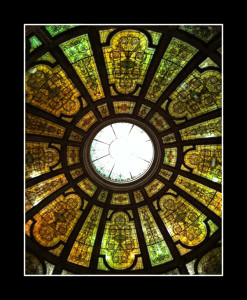
The translucence of stained glass suggests transcendence, while displaying the reality that darkness cannot overcome light. Light infused colored glass stirs emotions. Nature, color and beauty are, as Calvin said, intended for joy.
Some don’t believe beauty is “intended” (by God) to cause rejoicing. They believe beauty is a “fitness signal” producing an adaptive effect for survival. Beauty is, according to this materialistic world view, nature’s way of pleasing us so that we move forward in our quest for survival.
The idea is that beauty is a kind of nature trick to engage our emotions and move us onward and upward to find “love”, and “pleasure “, a sense of “romance” that keeps us reproducing. I put those nouns in quotation marks, because in materialism, they don’t mean what you think they mean. They might mean what you think in a small way, but mostly they are just words for a biological/mechanical process that has no ultimate meaning other than keeping us around as a species.
You can hear the theory expressed in more detail in an entertaining TED talk by philosopher Denis Dutton called A Darwinian Theory of Beauty: http://www.ted.com/talks/denis_dutton_a_darwinian_theory_of_beauty
Dutton worked, I gather, from a naturalistic philosophy that there is no divine intent; only random naturalistic intent. Evolution, in this view, has as its only agenda, survival. The website ieatheist.org (the Inland Empire Atheist website) cites Dutton as teaching humans evolved to love art because it helps them survive.
No more, no less.
Stained glass would be one of those fitness signals that would put us in awe, but not because anything is really awesome, in any eternal, or religious sense. Awesomeness is only a mechanism of evolution randomly (and without ultimate purpose) “designed” (another feint, since there is no designer) to keep us from being bored to death (which is contrary to survival). They may not say it quite like that, but that’s how it appears to me at my stage of brain evolution (yes, that’s supposed to be a joke).
While Dutton was compelling, I think he was short sighted and settled for less. He gave impersonal, random forces a large amount of credence in explaining why we gaze, gasp, swell, and rejoice at the sight of beautiful things. Dutton died in 2010, hence the past tense references.
I counter the idea that evolution has fooled us into thinking art and beauty are significant only for the purpose of keeping us alive. I find this a “lesser”, unsatisfying view. I believe art and beauty are signals, for “more”.
Since Dutton couldn’t go back and repeat the beginnings of human origin, I’m going to charge that his confidence in evolution’s modus operandi was a position he held by faith. I hold my position by faith as well, and I admit it. Dutton said that beauty is a “gift” from our ancient ancestors and is deep in our minds.
In all fairness I got the impression Dutton really did enjoy art and had a very high view of beauty. But in my thinking, his view was not high enough and since he was a philosopher, I hope he went deeper than materialism.
Beauty is deep in our minds, and it is a gift. It comes down through our ancestors, but it didn’t originate with them. Beauty and awe awaken our souls because they are meant to. They may help keep us alive, they certainly help us flourish, but beauty and awe have deep intentional purpose.
Beauty pushes us past enjoyment to rejoicing. It is possible for some to dull their souls to awe-filled response, but most people don’t. That’s good, because in addition to being easy on the eye, beautiful things are clues and reminders that we are meant for more than temporary survival.
Joy
The Westminster Shorter Catechism begins it’s Q&A lessons by answering that the chief purpose of human existence is to “glorify God and enjoy him forever”. Enjoyment, joy, rejoicing, are not key components of every religion or world-view. In Christianity rejoicing in the beauty of God, and his creation, is primary.
If I understood Dutton’s materialism, beauty and rejoicing are only nature’s gimmick’s. They are pleasant, but not transcendent. They are, in the end, cold, impersonal, and indifferent biological mechanisms. You may want to thrive, but if you don’t, that’s no skin off the universe’s back. In any event, evolution’s gimmickry will only last so long, because the universe will burn out, and nothing will have ultimately meant anything.
That is the chief end of atheism, and that ain’t much.
I’ll stand with Calvin and insist that there is “not one blade of grass, no color in this world, that is not intended to make us rejoice.”
I’m certainly not saying art and stained glass will by themselves put us in relationship with God, but if we pay attention, they may help us ask why we fill with wonder, awe, and delight in the presence of beauty, light, colored glass and starry nights.

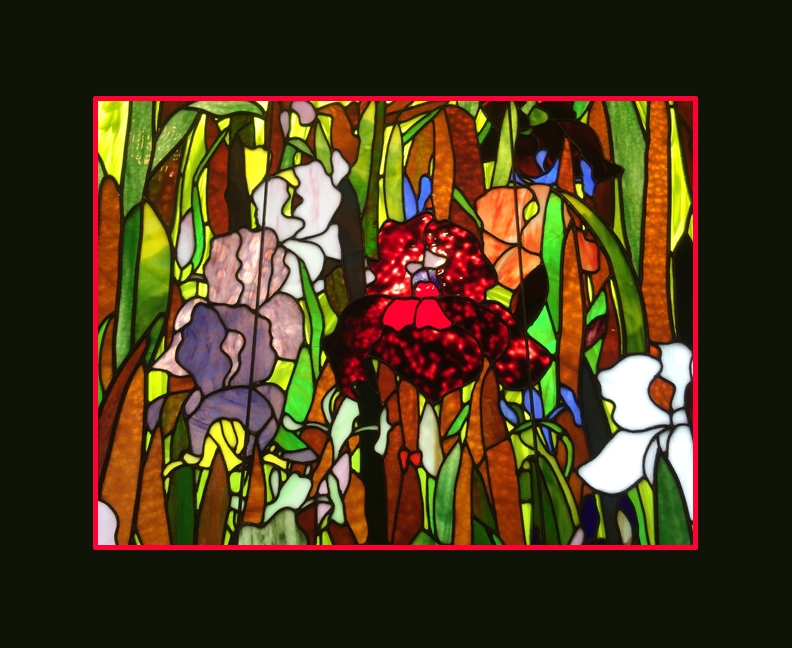
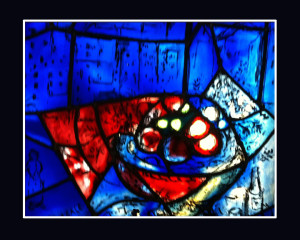
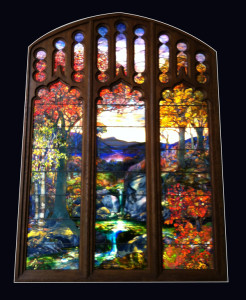
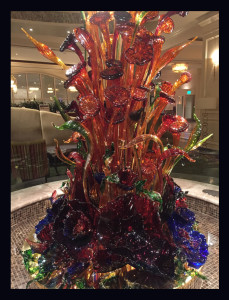
Kids and the tree are gorgeous!!! How in the world did you keep so many ormaennts toward the bottom with 2? My 15mo DD is our only one right now and she took every single ornament she can reach off.